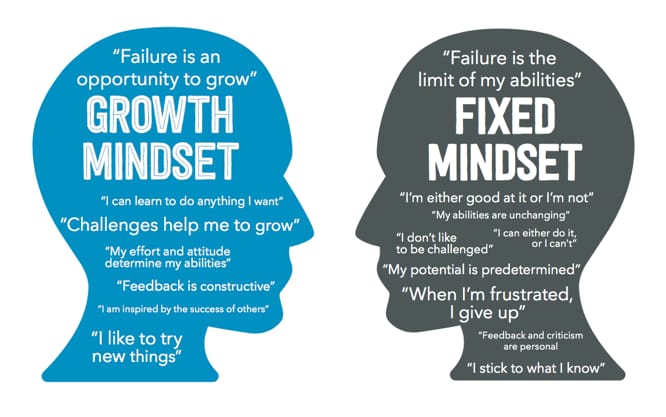
Straight into it today with this week’s newsletter. 18 ideas on how you can thrive and upgrade.
Whatever you do, don’t try and do everything at once.
Focus on 2 or 3 things at a time max.
Be really intentional about building these new behaviours or competencies into your development plan and journey, then evaluate what’s working and what’s not through introspection.

1) Take Responsibility - when you or your team make mistakes or miss the mark, own it. The quicker you take ownership, the quicker you can start brainstorming solutions and mapping out a path to improve and get better.
There are always opportunities in every setback, in every failure and in every rejection. Sometimes you have to have an open mind and be willing to get uncomfortable with the truth. It’s tough, I dislike that feeling when I get tough feedback or a customer tells me we suck but thank the source.
If customers and employees are willing to share feedback, it’s because the vast majority care about you and the partnership. When they come knocking, let them in and take responsibility.
2) Be Human - rules, processes, and policies are all in place for normal conditions and business as usual. Life is not as straightforward as that, you have to recognise at times you need to exercise your authority and bend the rules. People go through difficult situations and we need to foster an environment of flexibility and openness to always do right by the individual.
3) Goals - set goals and objectives for what you want to achieve. Leaders have clearly defined goals for what success looks like, and they then map out a plan to get them there. Without goals, we don’t have direction or focus and we end up drowning in the busy work. Goals also allow you to measure progress and determine what success looks like. What are your personal goals for the next 1, 3 and 5 years?
4) Emotional Intelligence - Self Awareness, Self Regulation, Empathy, Social Skills and Internal Motivation are all key areas of Emotional Intelligence. You will grow significantly by working on these areas and developing your awareness.
5) Belief System - what you believe is how you live. Be open to changing what you believe. Your thoughts drive your emotions which impact your decisions. These decisions shape the actions and ultimately the results you see.
Some one-off or tough experiences create limiting beliefs that hinder people for years and years and they don’t realise it, it’s just what they believe. Change what you believe, you change your results. Some ideas here around beliefs.
6) Journaling - is a really powerful way to facilitate self-awareness. Try it. Journaling consistently will open your mind, your awareness and allow time for reflection and huge gains in perspective. Carve out time in your week for Journaling and Self Reflection. Some other benefits in this article.
7) Growth Mindset - Carol Dweck’s Fixed vs Growth Mindset really does have a profound impact on how we lead our lives. A Fixed Mindset is a person that doesn’t learn from their mistakes, they see their skills as fixed, they don’t try and they’ll happily blame other people for their shortcomings. Someone on the other hand with a Growth Mindset sees the opportunity in the face of setbacks, they know because they’re not there today, it doesn’t mean they cannot gain new experiences, skills, and perspective and be there tomorrow. Growth Mindset people achieve so much more.

8) Kaizen - is a Japanese term meaning "change for the better" or "continuous improvement." Always be looking to deliver more and make things better every day. Toyota achieved much of its early success by adopting this philosophy, it maximized quality, reduced waste, and looked for improvements constantly.
9) Courageous - sometimes you need to disagree, stand up, and go against the grain at times. It’s not easy, but it’s sometimes the right thing to do if it’s what you believe. Do yourself a favour and start building more mental resiliency now, challenge yourself each day to do something uncomfortable.
10) Giving - the real secret of living? Is Giving. Whether to your community, a random stranger, or people around you. Offer your time, money, or resources to help others. Not only does it provide tremendous value, but it’s also very rewarding and has a funny way of coming back to help you. The real beauty of giving is that it’s not a one-time thing; rather it’s a spirit that you carry with you. Leaders are selfless, their purpose is to contribute to something greater than themselves.
11) Champion - be a champion of change and do the right things to support the business. Putting your hand up for that new initiative or supporting the effort of others to make something successful. Help other people to win.

12) Enlist - bring your team and your people along for the ride. Always look to collaborate. Organise team brainstorming meetings to discover ways to improve and overcome challenges. You’ll be amazed at some of the viewpoints and perspectives shared when you just sit and listen. People feel a higher sense of purpose and engagement when they’re contributing to something meaningful.
13) Coaching - spend less time giving advice and telling people what to do, and more time listening and asking questions. As the old saying goes “Give a man a fish and you feed him for a day. Teach a man to fish and you feed him for a lifetime.” Developing people and giving them the tools and frameworks to solve their own questions or challenges really helps scale a high-performing team based on trust and autonomy.
14) Cheerleader - be your people’s number one fan. Motivate and inspire them to keep going, dig in and improve every day. Encourage them to step up and constantly be looking to level up their skills. Praise them for all the good work they’re doing.
15) Blockers - your team or people will have friction or noise in their environment. Your role is to clear these blockers and at times fight their corner, and filter out pressure from customers and other teams. Ensure you’re always doing right by them and there is nothing stopping them from being successful.
16) Develop more Leaders - focus on creating more leaders, not followers. This means inviting people into the ideation, enlisting them in the decision-making process, empowering them to make decisions, and challenging them to think critically. So whether you are present or not, your people can still think for themselves, make effective decisions and march on. A team with too many followers lacks creativity, energy and grinds to a halt when the leader is not present, which is not a great way to run a team or organisation.
17) Strategic Planning - having a road map for the next 6 - 12 months is really important so you can plan effectively. Leaders who have a great plan know where they’re going and feel more comfortable with the journey. They know things are not always going to be rosy but they have a plan which can help them navigate the challenges ahead. Pro Tip: Give your team transparency and awareness on what’s to come in the next 30 days, they’ll love that visibility.

18) Document - document your processes, your interactions, your thoughts, your plan, your mistakes, your tasks and your journey. Write stuff down, it helps you remain super organised and hold yourself and your team accountable. A “Second Brain” is a powerful way to build a personal digital repository of your life’s work. See more here.
Thanks for reading. Hope these ideas help you to continue to improve and help others to be successful.
All the best
David
Resources Of The Week
YouTube Video - Jack Welch on Management Style. Jack talks about how to be a great manager and the environment you should be creating.
Book - 5 Dysfunctions of a Team by Patrick Lencioni. This book explores the five dysfunctions which go to the very heart of why teams even the best ones-often struggle. Patrick outlines a powerful model and actionable steps that can be used to overcome these common hurdles and build a cohesive, effective team. Just as with his other books, Lencioni has written a compelling fable with a powerful yet deceptively simple message for all those who strive to be exceptional team leaders.
Book - The One Minute Manager. This easily-read story quickly demonstrates three very practical management techniques: One Minute Goals, One Minute Praisings and One Minute Reprimands. The book is brief, the language is simple, and best of all … it works.
Quote of the Week
"You always pass failure on the way to success." ―Unknown
If you’re finding this newsletter valuable, consider sharing it with friends, or subscribing if you haven’t already.
Last week’s issue: Managing up
If you found this week’s newsletter useful, I’d love it if you could share it with someone who needs a touch of inspiration. Just click on the button below.